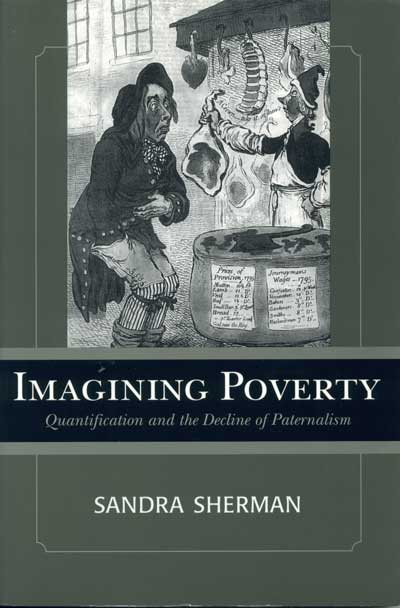
Imagining Poverty
Quantification and the Decline of Paternalism
Sandra Sherman
“Sandra Sherman has produced a work that opens a completely new field of inquiry, the representation of the poor in English writings of the late eighteenth and early nineteenth centuries. There is no question that this is well, indeed magnificently, researched book and that is part of a very promising movement to read what we have formerly dismissed as ‘ephemeral’ texts as part and parcel of the whole drama of Enlightenment. Multicultural and multidisciplinary, it is a fascinating read that holds, nay mesmerizes, the interest while it overturns dozens of critical shibboleths and manufactures new knowledge with a vigor and efficiency that even Count Rumford would admire.” —Kevin Cope, Louisiana State University
“This is a well-written book that offers a good number of surprises. In fact, the materials here can be seen as offering an important prologue to the much better known world of Victorian literature. For me, the strongest and most enlightening sections were the perceptive and sensitive readings of the rhetoric of Eden, Rumford, and the rest of the cultural critics. All in all, Sherman makes some very shrewd comments about the history of British social and economic thought.” —Philip Jenkins, Pennsylvania State University
Imagining Poverty is an interdisciplinary study of public attitudes toward the poor in Britain between 1790 and 1835. Sandra Sherman reconsiders a question that has challenged social historians for years: what changes (political, economic, and philosophical) lead to the New Poor Law of 1834? As new, scientific methods of regulating the poor were adopted—such as statistics, cost accounting, and cost/benefit analysis—old-fashioned paternalism gave way to newer modalities in which the poor were not addressed as individuals but instead were managed en masse. The “poor” became “poverty,” a political/economic condition that could be managed from a distance by professionals who had no contact with individuals and made no accommodations to them.
Sandra Sherman is an Associate professor in the Department of English
at the University of Arkansas. She is also the author of Finance and Fictionality
in the Early Eighteenth Century: Accounting for DeFoe.
|
Oct 2001
Literature/History 336 pp. 6 x 9 10 illustrations |
|
| $26.95 paper 978-0-8142-5083-9 | Add paperback to shopping cart |
| $68.95 cloth 978-0-8142-0885-4 | Add cloth to shopping cart |


